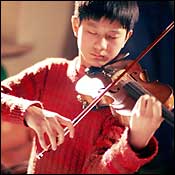
Even when he’s fiddling up a storm, Xiaochun (Tang Yun), the 13-year-old violin prodigy in Chen Kaige’s Together, has a nearly blank face. Since this is a coming-of-age movie about a poor rural kid who grapples with the big city, it would be nice if its protagonist weren’t such a lummox. The frenzies and elations of music-making are not a part of Xiaochun’s makeup. Meanwhile, just about everything else in Together is spurious and overwrought.
Central to the film is the notion that in the modern world—or at least in post–Cultural Revolution China—one must choose between mastering one’s art and becoming a commercial success. At the beginning, Xiaochun’s doting, uneducated single father, Liu Chen (Liu Peiqi), takes the boy to Beijing to audition at a prestigious music school. Although he places high, he loses out to internal politics and is reduced to studying violin with a dissolute professor, Jian (Wang Zhiwen), whose messy, earth-toned apartment, crawling with cats, signals to us that he’s artistic. By contrast, Professor Yu (played by Chen Kaige), the starmaking martinet Xiaochun reluctantly takes up with, inhabits sleek, cool-blue interiors. The movie would have us believe that the price of fame is soullessness—which should come as news for all the famous soulful artists out there.
If this moral lesson turned up in an American movie, it would probably be laughed off the screen. (American audiences are gullible in the other extreme: They think commercial success is the apex of artistry.) And yet the sentimentality here seems like a frank appeal to Western tastes: The movie features music that is almost exclusively Western and classical, while the rich Chinese musical tradition is all but ignored. In any case, Chen doesn’t seem very interested in what music means to Xiaochun or his father. Rarely do we see them transported by sound, in part because we almost never see the boy practicing. Apparently he’s a genius full-blown.
Is Chen saying that in modern China, with its commercial ties to the West, selling out is inevitable for the artistically gifted? Is this why Xiaochun, in a blaze of glory, turns his back on celebrity by choosing to return to the provinces with his father? The incursions of capitalism have undoubtedly had wrenching effects on China’s national character, but it would be a cultural calamity if old-guard Chinese equated international (read: Western) celebrity with spiritual corruption. It’s possible, believe it or not, to be rich and pure—especially in the classical-music world. Xiaochun’s final retreat into obscurity is meant to be triumphant, but it plays like a scene from Dumb and Dumber.
More than three years ago, Andrew Jarecki, the founder of Moviefone, decided to make a documentary about David Friedman, New York’s premiere children’s-birthday-party clown. What he uncovered instead was a family scandal: In 1987, David’s father, Arnold, a respected Great Neck schoolteacher, was arrested for possessing child pornography; along with his 18-year-old son Jesse, he was also charged with having sex with minors. In the not-terribly-probing interviews Jarecki conducted with lawyers and sex-crime investigators for Capturing the Friedmans, the Rashomon-like recounting of these charges leaves it ambiguous as to the exact nature of the father’s and son’s guilt.
Even pre-scandal, the Friedmans extensively filmed their day-to-day lives—as if they were waiting for someone, someday, to make a documentary about them. Jarecki shows off this footage as evidence of a truly dysfunctional family in various stages of denial. What it reveals at least as much is the modern phenomenon of reality-TV self-exposure carried to such lengths that, by comparison, the Osbournes look like the Cleavers.
Together
Directed by Chen Kaige; starring Tang Yun, Liu Peiqi, and Chen Hong.
Capturing the Friedmans
Directed by Andrew Jarecki.